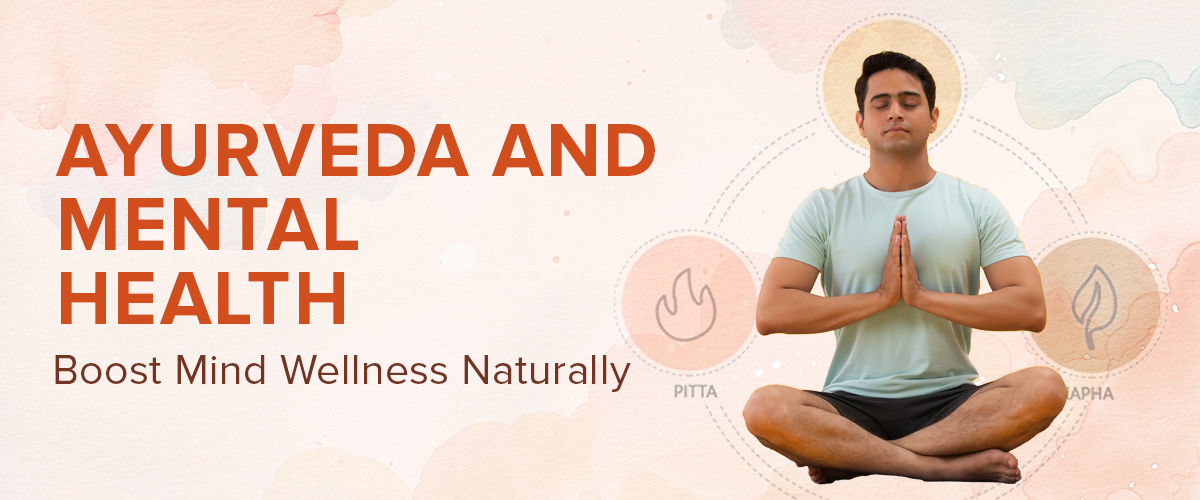According to the World Health Organisation, India experiences a suicide rate of 21.1 per 100,000 population, which is one of the highest globally. Along with this, the National Mental Health Survey 2015-16 reported that 10.6% of adults in India suffer from mental disorders.
Despite these shocking figures, mental health is still a neglected topic in our country. The associated stigma, insufficient awareness and restricted access to mental health services are some reasons why people hesitate to seek help for this condition.
Ayurveda focuses on preventive care and natural healing methods, making it a valuable resource for your mental well-being. In this blog, we will explore how Ayurvedic principles and practices can be integrated into your daily life to improve your mental wellness naturally.
Why Mental Health Is a Major Concern in India?
Nowadays, mental health issues have become a more common issue than you may realise. Issues like job pressures, educational tension, social isolation and monetary anxieties all add to depression and anxiety.
Despite the rising need for mental health support, many individuals hesitate to seek help due to stigma and lack of awareness. This reluctance could result in untreated mental health conditions which can impact your quality of life deeply.
What Do Statistics Say About Mental Health Issues In India?
Recent research shows the huge prevalence of mental health problems in India:
- The World Health Organisation cites an age adjusted suicide rate of 21.1 for 100,000 people as among the highest such ratio recorded worldwide.
- In the 2015-16 National Mental Health Survey, it was found that 15% of Indian adults require active intervention for one or more mental health issues, with one in 20 Indians suffering from depression.
- A 2023 analysis found 74% Indians experienced stress and 88% had some kind of anxiety disorder.
These figures prove the need of raising awareness regarding mental health in our country.
How Does Ayurveda View Mental Health?
As per Ayurveda, mental health isn't always the lack of mental illness; instead it's a harmonious state of the mind, body, and spirit. Ayurveda shows that balance, strength, and connection to the inner self and the world are the secrets to good mental health. It also believes that mental health is associated with spiritual growth and physical health as well.
What Are the Ayurvedic Causes of Mental Stress and Anxiety?
Ayurveda introduces the concept of doshas - Vata, Kapha and Pitta - as your body’s energies which regulate all your psychological and biological functions.
Ayurveda suggests natural remedies and lifestyle changes to maintain balance in your doshas using meditation, yoga, and herbal treatments. When you understand your dominant dosha and learn how to nurture it, you can improve your mental health and vitality.
Vata (Air and Space): Vata governs your movement and flexibility. When your Vata is balanced, you feel creative, lively, and energetic. But when it is not in balance, you might feel anxious, scattered and overwhelmed. Your Vata can be high if you suffer from anxiety or have difficulty concentrating.
Pitta (Fire and Water): Pitta governs your digestion and metabolism. A balanced Pitta makes you feel intelligent and determined. But if Pitta dominates, you may experience irritability, anger and judgmental behaviour. So, in case you feel continually frustrated or critical, this could be due to Pitta imbalance.
Kapha (Water and Earth): Kapha provides the energy which builds the body’s structure (bones, muscles & ligaments) and serves as the "glue" among tissues. A well balanced Kapha provides calmness, endurance, and strength. An excess of Kapha could result in sadness, attachment and resistance to change.
How Environment and Lifestyle Impact Your Mental Health As per Ayurveda?
Your day to day routine and your surroundings are essential for maintaining mental balance. Ayurveda stresses the need for a regular schedule or routine and a relaxed atmosphere for better mental health. Here, we have mentioned some ways in which your lifestyle and surroundings can impact your mental health:
Routine: A ‘Dinacharya’ helps to control your biological clock, sleep and digestion, which are needed for mental calmness. Routine disruption could affect your dosha balance and lead to stress and anxiety.
Diet: What you eat directly affects your doshas and thus, your mental state. Foods which upset your doshas may cause mental disturbances. For instance, caffeine or processed food can increase Vata and cause anxiety.
Nature & Seasons: Every season influences your doshas differently. For example, the cold dry winter might increase Vata and make you feel lonely or anxious. Ayurveda recommends adjusting your lifestyle and diet based on the season for maintaining dosha balance.
Ayurvedic Remedies for Mental Health Management
Ayurveda provides several natural remedies to improve your mental health. These herbs help by balancing your doshas and promoting complete wellness. Let us now explore some important Ayurvedic herbs and see some techniques to integrate them into your daily routine.
1. Ashwagandha (Withania Somnifera)
Ashwagandha is known to decrease stress and promote clarity of mind and calmness. It works on the nervous system by buffering the effects of persistent stress and helps to calm Vata imbalances.
Pro Tip: Start with a quarter to half teaspoon of Ashwagandha powder and take it with warm milk or water just before going to bed. This calms your Vata and induces sleep. Be patient as the advantages of Ashwagandha take time to show.
2. Brahmi (Bacopa Monnieri)
Brahmi is thought to boost cognitive function. It can help with memory, nervousness, and overall focus. It is especially useful to balance your Kapha and Pitta doshas.
Pro Tip: Take Brahmi in the morning as a tea or capsule. If you are a student or a professional, this can help you focus much better. Ask an experienced Ayurvedic practitioner for correct dosage based on your body constitution or Prakriti.
3. Gotu Kola (Centella Asiatica)
Gotu Kola is another Ayurvedic herb which supports mental clarity and cognitive function. Additionally, it is used for its soothing effects on the mind, that make it useful for depression and anxiety.
Pro Tip: Gotu Kola can be taken fresh as juice or tea. Drink Gotu Kola tea in the morning for better mental clarity. Also, it comes in topical forms like lotions for skin wellness.
4. Turmeric (Curcuma Longa)
Turmeric consists of curcumin, a substance which has antibacterial and antioxidant properties and assists if you have anxiety and depression symptoms.
Pro Tip: You can add turmeric to your diet in cooking or you can take it as a hot tea to begin your day. Use it with black pepper for maximum absorption of the curcumin.
5. Jatamansi (Nardostachys Jatamansi)
Jatamansi is an Ayurvedic herb known for its sedative qualities and for its ability to stabilise mood swings. It's particularly great for controlling Vata and Pitta imbalances in your body.
Pro Tip: Use Jatamansi oil in an aromatherapy diffuser before bed to calm your mind and induce better sleep. It can also be taken orally as a powder.
6. Tulsi (Holy Basil)
Tulsi is believed to be an effective adaptogen. It has a soothing effect on your mind and could help lower anxiety.
Pro Tip: Drink Tulsi tea daily for stress relief. You can grow Tulsi at home to have fresh leaves always ready.
7. Saffron (Crocus Sativus)
Saffron is a spice known in Ayurveda for its ability to boost your mood. It helps with mild to severe depression and promotes cheerfulness.
Pro Tip: You can add some saffron strands to your daily tea or milk. It can help to lift your mood and also give your beverage a delicious taste and aroma.
8. Bhringaraj (Eclipta Alba)
Bhringaraj is usually used in Ayurveda for improving your body’s vitality and calming the mind. It's particularly helpful in reducing stress, depression and anxiety symptoms.
Pro Tip: Bhringaraj can be taken as a tea or capsule. Massage Bhringraj oil into the scalp before bed for direct calming effects. This helps calm the nervous system and also encourages hair growth.
9. Shankhpushpi (Convolvulus Pluricaulis)
Shankhpushpi is recognised in Ayurvedic medicine for its abilities to boost the mind. It increases cognitive functions and memory and is also a well-known stress reliever.
Pro Tip: You can take Shankhpushpi in syrup form. It works best if it’s taken before bedtime to promote sound sleep and mental clarity.
10. Guduchi (Tinospora Cordifolia)
Guduchi is an adaptogen which helps the body resist physical, chemical, or biological stress. It relaxes your mind and also increases mental clarity.
Pro Tip: Guduchi can be taken as a powder or juice. Take a teaspoon of Guduchi powder with honey every morning for improving mental clarity.
Pro Tips: Easy Ayurvedic Practices for Mental Wellness
Incorporating these Ayurvedic practices into your everyday life need not be time-consuming or difficult. Here are some easy suggestions to help you adopt these practices and stay physically and mentally healthy:
1. Start Your Day with Warm Water: Begin each morning by drinking a glass of hot water. This basic habit promotes digestion and flushes out toxins that build up overnight. It is a gentle wake-up call for your body and sets a positive tone for the day.
2. Practice Oil Pulling: Take 1 tablespoon of sesame or coconut oil in your mouth first thing in the morning, swish it around for 10 minutes, and spit it out. This traditional practice strengthens your gums, whitens your teeth and also improves oral health, which supports overall wellness.
3. Use Abhyanga (Self-massage): Take a few minutes every day performing a self-massage using Ayurvedic oils. Abhyanga nurtures your skin, calms your nervous system and rejuvenates your body. It helps to bring down Vata imbalance, which can be the reason behind your restlessness and anxiety.
4. Eating Mindfully: Focus on eating in a peaceful atmosphere, chewing your food properly and enjoying every bite. Mindful eating helps with digestion and balances your Kapha, which could cause sluggishness and weight gain, if it is imbalanced.
5. Take Short Meditation Breaks: Even if you can practice a few minutes of meditation per day it can help you ease stress and promote clarity of mind. Find some quiet moments every day to close your eyes and completely focus on your breathing.
What Foods Should You Eat to Boost Mental Wellness According to Ayurveda?
In Ayurveda, foods which are nutritious and help to balance your doshas are believed to support your mental wellness. Here, we have mentioned some especially good foods for mental health :
Ghee & Oils: Healthy fats like ghee (clarified butter) and coconut oil nourish the brain and stabilise your mood. They aid in absorption of fat soluble vitamins which are necessary for brain health.
Nuts & Seeds: Almonds, walnuts, flaxseeds and sunflower seeds have omega 3 essential fatty acids, which could help with focus and depression relief.
Green Leafy Vegetables: Spinach, kale and other greens contain folate and vitamins which aid in reducing fatigue and depression.
Fresh Fruits: Fruits, particularly those loaded with vitamin C (like oranges and berries), can help reduce stress and improve mood.
Whole Grains: Grains like oats, quinoa, and whole wheat can provide you with sustained energy to think clearly.
Which Foods & Substances Should You Avoid for Good Mental Health?
Just as these above mentioned foods help you feel better mentally, there are some food products that may harm your mental health. These are some food items to avoid:
Refined Sugar: High sugar may cause swings in blood glucose levels accompanied by mood swings and energy spikes/crashes.
Caffeine: Caffeine might be a quick stress reliever, but excessive caffeine could make you feel nervous and interrupt with your sleep routines.
Processed Foods: These are usually high in unhealthy fats and additives which damage your brain’s health.
Alcohol: Alcohol can depress the nervous system and alter mood stability, besides impacting liver health, which is essential for detoxifying the body.
What Are Top Ayurvedic Therapies for Anxiety & Anxiety?
Ayurveda provides you access to a number of therapies to ease your stress and anxiety. Here, we have mentioned some effective therapies that might help you find peace and balance:
Shirodhara: In Shirodhara therapy, warm oil is poured gently onto the forehead, specifically over the third eye. This process is deeply calming and is believed to quiet the mind and reduce mental tension.
Abhyanga (Ayurvedic Massage): This full body massage using natural herbs encourages blood circulation and calms your nervous system. It especially helps with reducing Vata imbalances, which may make you feel restless and anxious.
Nasya: Nasya treatment involves the administration of herbal oils through the nostrils, which directly affect the mind and nervous system. Nasya helps in clearing the mind and releasing stress.
Final Thoughts
Ayurveda helps you retrace your steps towards your body’s natural rhythms, your balance of mind and body, and towards greater mental health. It’s about finding harmony in the small daily practices that align with the ancient wisdom of this holistic practice.
Remember, mental wellness isn't a destination but more of a continuous path that flourishes with consistent care and understanding of your body’s needs. So, why not start today?
Take control of your mental health with expert advice from Jiva’s certified Ayurvedic doctors. Call us on 0129-4264323 today.
FAQs
Can Ayurveda treat mental health?
Yes, Ayurveda helps you improve your mental health by balancing the body's energies (doshas) using natural remedies, lifestyle modifications and therapies like Shirodhara and Nasya. It treats the root causes of psychological distress, instead of just the symptoms.
Which branch of Ayurveda treats mental disorders?
The branch of Ayurveda that deals with mental disorders is called 'Bhuta Vidya' or 'Graha Chikitsa.' It concentrates on psychological conditions and provides holistic treatments using natural herbs, diet and yoga.
How can you improve your mental health naturally?
Include a balanced diet, regular exercise, sufficient sleep and practices like meditation and yoga in your daily routine to improve your mental health. Engaging in hobbies and social interactions can also boost mental well-being.
Which dosha is responsible for mental health?
All 3 doshas, i.e., Vata, Kapha and Pitta - have effects on your mental health, but Vata is mainly related to your nervous system and mind. Vata imbalances could result in anxiety and fear and could impact your mental health directly.
What is psychiatry called in Ayurveda?
In Ayurveda, psychiatry is widely known as 'Mano Chikitsa', meaning 'treatment of the mind'. It includes treatments for psychological and emotional disturbances.
What is the best therapy for mental disorders?
Although individual treatments differ, medhya herbs like Brahmi and Ashwagandha are considered effective remedies for improving brain function and relieving stress. Regular meditation and consuming a nutritious diet are also essential.
Which is the best herb for mental health?
Ashwagandha is highly regarded in Ayurveda for its stress-reducing and neuroprotective properties. It stabilises your mood, reduces anxiety, and also increases mental resilience.
What is the 3-3-3 rule for anxiety?
The 3-3-3 rule is a grounding technique to manage anxiety quickly. When feeling anxious, you identify three things you can see, three sounds you can hear, and move three parts of your body (such as your ankle, fingers, and shoulders). This practice helps refocus and calm your mind.























































